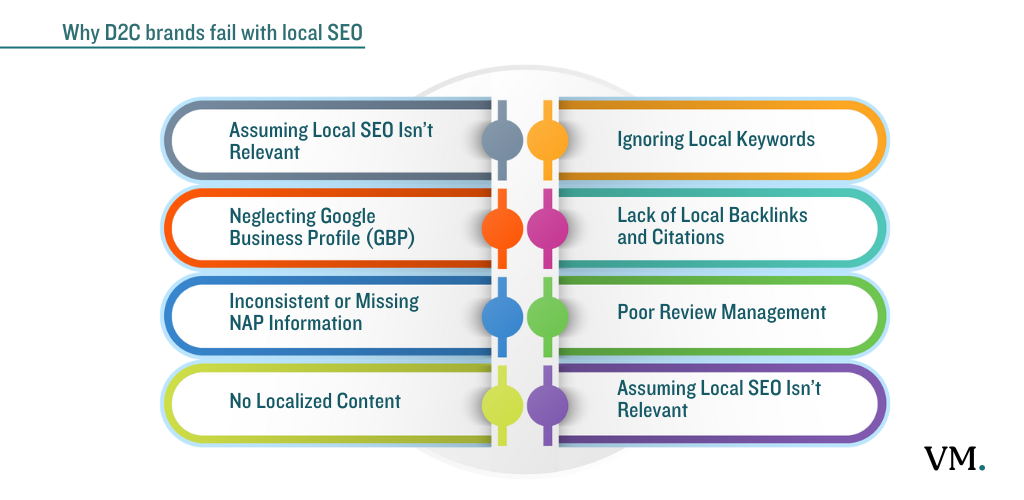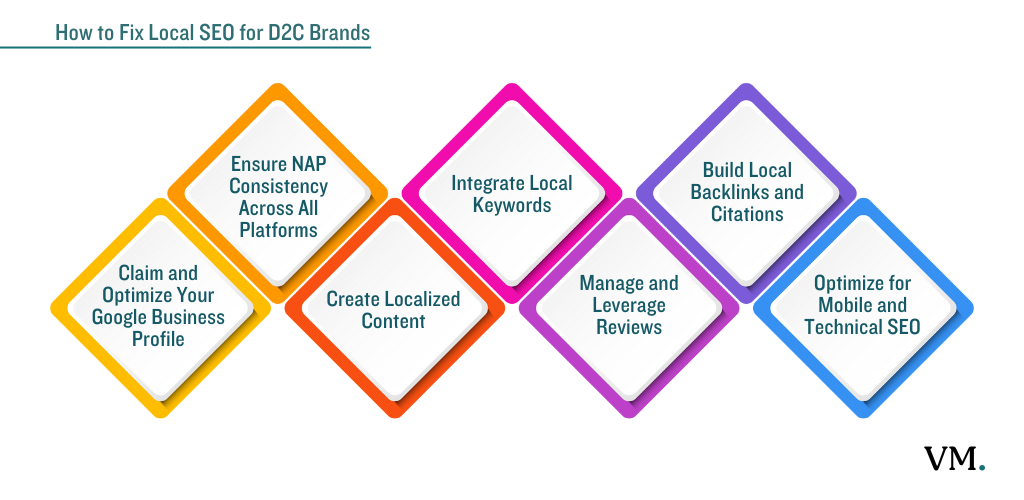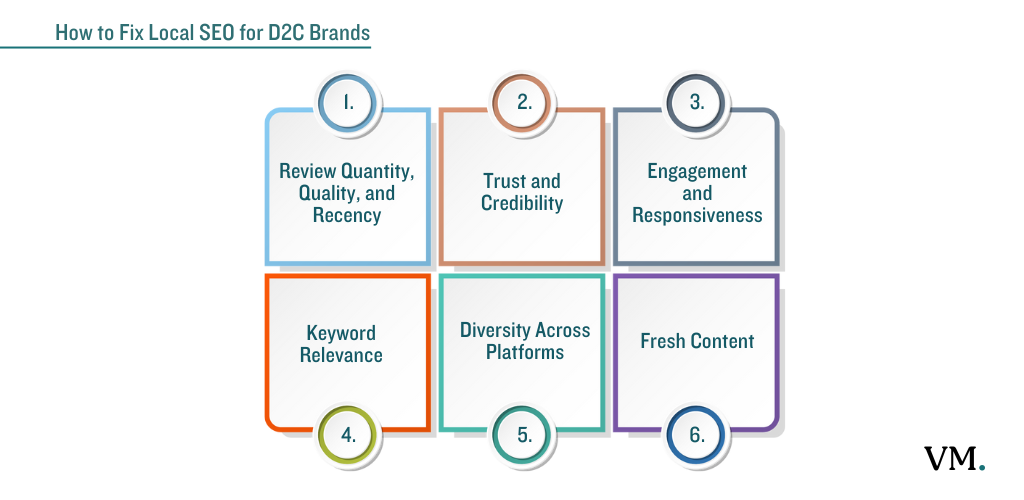Direct-to-consumer (D2C) brands have revolutionized how products reach customers, bypassing traditional retail channels to build direct relationships. However, many D2C brands struggle with local SEO—a critical growth lever for capturing nearby customers and driving both online and offline sales. Let’s dive into the reasons why D2C brands often miss the mark on local SEO and, more importantly, how to fix it.
Why D2C Brands Fail With Local SEO

1. Assuming Local SEO Isn’t Relevant
Many D2C brands believe that local SEO only matters for brick-and-mortar stores. In reality, even online-first brands can benefit by targeting local audiences, promoting pop-ups, events, or same-day delivery in specific areas. Ignoring local SEO means missing out on high-intent, geographically relevant traffic.
2. Neglecting Google Business Profile (GBP)
A common mistake is failing to claim or optimize a Google Business Profile. Without a GBP, D2C brands are invisible in Google Maps and local search packs, drastically reducing their local discoverability.
3. Inconsistent or Missing NAP Information
Name, Address, and Phone Number (NAP) consistency is vital. Discrepancies across directories and platforms confuse search engines and customers, leading to lower rankings and trust issues.
4. No Localized Content
D2C brands often focus on national or global content, overlooking the power of local landing pages, blog posts about community events, and location-specific product pages. Without localized content, brands fail to rank for local intent searches.
5. Ignoring Local Keywords
Generic keywords won’t help you rank for “near me” searches or city-specific queries. Many D2C brands skip researching and integrating local keywords into their site structure, metadata, and content.
6. Lack of Local Backlinks and Citations
Local backlinks (from area blogs, news outlets, or organizations) and directory citations are strong ranking signals. D2C brands rarely invest in building these, missing out on valuable authority and relevance.
7. Poor Review Management
Online reviews are a major trust factor for local SEO. Many D2C brands overlook review generation and fail to respond to feedback, both positive and negative. This not only impacts rankings but also brand reputation
8. Mobile and Technical SEO Issues
Local searches are predominantly mobile. Slow load times, non-responsive design, or missing local schema markup can tank local rankings and user experience.
How to Fix Local SEO for D2C Brands

1. Claim and Optimize Your Google Business Profile
- Claim your GBP and fill out every section: business name, address, phone, website, hours, and categories.
- Add high-quality photos, updates, and posts regularly.
- Encourage happy customers to leave reviews and respond to all feedback.
2. Ensure NAP Consistency Across All Platforms
- Audit your NAP information on your website, social profiles, and all directories.
- Fix any inconsistencies or outdated details.
- Use the same format everywhere (e.g., “Street” vs. “St.”).
3. Create Localized Content
- Build dedicated landing pages for each target city or neighborhood.
- Write blog posts about local events, partnerships, or customer stories.
- Highlight local delivery options, pop-ups, or store locations if applicable.
4. Integrate Local Keywords
- Use tools like Google Keyword Planner to find high-volume local search terms.
- Incorporate these keywords naturally into titles, meta descriptions, headers, and body content.
- Don’t forget to optimize image alt text and schema markup with local details.
5. Build Local Backlinks and Citations
- Get listed in reputable local directories (Yelp, Chamber of Commerce, etc.).
- Partner with local influencers, blogs, or media for features and backlinks.
- Sponsor or participate in community events to earn mentions from local organizations.
6. Manage and Leverage Reviews
- Proactively ask customers for reviews after purchase or engagement.
- Respond promptly and authentically to all reviews, addressing concerns and thanking supporters.
- Feature positive reviews on your website and social channels.
7. Optimize for Mobile and Technical SEO
- Ensure your website is fully responsive and loads quickly on all devices.
- Implement local business schema markup to help search engines understand your business.
- Regularly audit your site for technical issues that could impact local rankings.
Common Local SEO Mistakes and Solutions
| Mistake | Impact | Solution |
|---|---|---|
| No Google Business Profile | Invisible in local search/maps | Claim and optimize GBP |
| Inconsistent NAP info | Lower rankings, lost trust | Standardize NAP everywhere |
| No local content | Missed local search opportunities | Create city/neighborhood pages |
| Ignoring reviews | Lower trust and rankings | Request and manage reviews |
| Missing local backlinks/citations | Weak authority in local results | Build local links and directory listings |
| Poor mobile experience | High bounce rates, lost conversions | Optimize site for mobile |
A common mistake is failing to claim or optimize a Google Business Profile. Without a GBP, D2C brands are invisible in Google Maps and local search packs, drastically reducing their local discoverability.
Key Ways Online Reviews Impact Local Rankings
-
Review Quantity, Quality, and Recency: Google’s algorithm evaluates how many reviews your business has, how positive they are, and how frequently you receive them. Businesses with a higher volume of recent, high-quality reviews tend to rank better in local search results and are more likely to appear in the coveted Google Local Pack.
-
Trust and Credibility: Reviews act as social proof. A business with many positive reviews is seen as more trustworthy and credible, both by search engines and potential customers. This trust can directly translate into higher rankings and increased click-through rates from search results.
-
Engagement and Responsiveness: Actively responding to reviews—both positive and negative—signals to search engines that your business is engaged and values customer feedback. This activity can positively influence your local ranking.
-
Keyword Relevance: Reviews that mention specific products, services, or locations can help boost your local SEO by adding relevant keywords to your business’s online presence. This user-generated content helps search engines better understand your business and match it to relevant local queries.
-
Diversity Across Platforms: Having reviews on multiple reputable platforms (Google, Yelp, Facebook, and industry-specific sites) further strengthens your local SEO. Search engines see a diverse review profile as a sign of authenticity and broad recognition.
-
Fresh Content: New reviews provide a steady stream of fresh, user-generated content, which search engines favor. This ongoing activity keeps your business profile relevant and visible in local searches.

Quantitative Impact
A Moz study found that online reviews contribute about 15% of the factors influencing local search rankings. BrightLocal research also shows that 73% of consumers consider reviews older than three months to be irrelevant, highlighting the importance of regularly acquiring new feedback.
Click-Through and Conversion Rates
Businesses with strong ratings and positive reviews not only rank higher but also attract more clicks from search results. This increased click-through rate is another signal to Google that your business is relevant and trusted, further boosting your rankings.
Negative Reviews
While a few negative reviews are normal and can even add authenticity, a large number can lower your average rating and hurt your perceived trustworthiness, negatively impacting your local SEO.
In summary: Online reviews are essential for local SEO success. They influence rankings, build trust, increase click-through rates, and help your business stand out in local searches. Consistently encouraging and managing reviews across platforms is crucial for maintaining and improving your local search visibility.
Wrapping It Up
Local SEO is not just for traditional retailers—D2C brands that master it can unlock new customer segments, drive local loyalty, and outpace competitors. By addressing the common pitfalls above and implementing the right strategies, your D2C brand can become a local favorite, both online and offline.
Remember: local SEO is an ongoing process. Regularly audit, update, and engage with your local community online to maintain visibility and trust.
FAQ
Local SEO (Search Engine Optimization) is the process of optimizing your online presence to attract more business from relevant local searches. For D2C (Direct-to-Consumer) brands, local SEO helps capture nearby customers, drive traffic to pop-ups or events, and improve visibility in geographic areas—even if you don’t have a traditional storefront.
-
They assume local SEO is only for brick-and-mortar stores.
-
They neglect setting up or optimizing a Google Business Profile.
-
Inconsistent or missing Name, Address, Phone (NAP) information across platforms.
-
Lack of localized content and local keyword targeting.
-
Few local backlinks or citations.
-
Poor management of online reviews.
-
Technical and mobile SEO issues
Online reviews are a major factor in local search algorithms. Their impact includes:
-
Higher quantity, quality, and recency of reviews can boost local rankings.
-
Reviews build trust and credibility with both search engines and customers.
-
Responding to reviews signals engagement, which positively influences rankings.
-
Reviews mentioning specific products, services, or locations add relevant keywords.
-
Having reviews on multiple platforms strengthens authenticity and authority.
-
Regular new reviews provide fresh content, keeping your business relevant.
-
Claim and optimize your Google Business Profile.
-
Ensure NAP consistency across all platforms and directories.
-
Create localized content such as city-specific landing pages and local event posts.
-
Integrate local keywords into your website and metadata.
-
Build local backlinks and get listed in reputable local directories.
-
Encourage and manage customer reviews regularly.
-
Optimize your website for mobile and address technical SEO issues.
Reviews are highly influential—studies suggest they account for about 15% of local search ranking factors. However, they work best when combined with other efforts like NAP consistency, localized content, and technical optimization.
A few negative reviews are normal and can even add authenticity. However, a large number of negative reviews can lower your average rating and trustworthiness, which may negatively impact your local SEO. Responding to all reviews, both positive and negative, is important for maintaining a strong reputation.
Local SEO is an ongoing process. Regularly audit your online presence, update business information, create fresh local content, and engage with customer reviews to maintain and improve your local search visibility.
Google is the most important platform, but reviews on other reputable sites like Yelp, Facebook, and industry-specific directories also contribute to local SEO strength and authenticity.
Yes. Even online-first D2C brands can use local SEO to promote events, target local delivery options, or build brand presence in specific markets. Local SEO helps capture high-intent, geographically relevant traffic and can drive both online and offline engagement.
Share:




